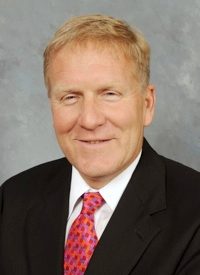
Tom Cross (left) the House Republican leader in the Illinois legislature, filed a bill Wednesday to probe a “charitable interpretation” of state law that granted at least eight Chicago labor officials eligibility for both city pensions and union pensions covering the same work periods. A Chicago Tribune/WGN-TV investigation discovered that some of these union officials await millions of dollars more in retirement due to double and even triple dipping on pensions.
The investigation confirmed that at least seven union officials are accruing retirement benefits in multiple pensions and one retired official is already collecting payments from two pensions, even though the law contains stipulations that "aim" to prevent such practices.
According to the report, one Chicago labor leader is anticipating retirement benefits of nearly $500,000 a year, while another expects to gain $438,000 from three separate pensions — a city laborers fund, union district council fund, and national union fund — all covering the same work period. In total, the 59-year-old union leader, Liberato "Al" Naimoli, is set to reap a whopping $9 million if he lives to his expected lifespan. President of Cement Workers Local 76, Naimoli is raking in almost $160,000 a year from his city pension. After retiring in 2010, he is also now eligible for a pension worth about $60,000 a year from the Laborers’ Pension Fund, and another $220,000 a year from a national union pension fund.
Political corruption and union mischief is nothing new for the city of Chicago. As reported by The New American, in late September another Tribune investigation exposed a former union leader, Dennis Gannon, who netted $158,000 in a public pension after working a single day. Gannon’s union influence, combined with a distorted city law, returned to him a lavish retirement:
After gaining high stature in labor politics, Gannon sought to gain from the city’s skewed law that would allow him to remain in the municipal pension fund. So he was rehired and the next day granted a leave of absence to work for Local 150. Illinois law permitted Gannon to retire in 2004, at 50-years-old, and since then he has incurred approximately $1 million in pension benefits, and is expected to pocket about $5 million during his lifetime.
In regard to the law, pension analysts, attorneys, and state lawmakers affirm that the state pension code contains stipulations that should prevent double dipping, although there is a loophole that allows pensions from national unions. City pension fund officials and their attorney, Fredrick Heiss, assert that the law is deliberately ambiguous and that if lawmakers really desired to prevent labor officials from benefiting from multiple pensions, they would have written the law more cautiously. "The Legislature never told us how to administer this thing," Heiss remarked. "They could have said ‘no second pension at all,’ but they didn’t say that."
Representative Cross acted on the Tribune/WGN-TV investigation, filing a bill Wednesday that would put an end to pension double dipping by preventing labor leaders who participate in city pensions from collecting any additional retirement benefits for the same work period. "This is double dipping on steroids — and it was meant to be illegal. Unfortunately, top union officials used a questionable interpretation of the pension law that allowed them to use a loophole to grab two or sometimes three pensions," Cross charged. "This is a disgrace — and must be remedied."
The proposal by Cross is one in a series of bills filed on city pension abuse, as he put forward legislation last month that would amend an overlooked provision planted into Illinois law two decades ago that has given almost two dozen Chicago union leaders an opportunity to seize $56 million in pension benefits. Gannon, the labor official who netted over $150,000 in pension money after working a single day, was one of those fortunate recipients.
"This package of bills is a no-brainer — I am disappointed that the pension funds’ boards of trustees did not refer this matter to law enforcement earlier," Cross declared. "We are all supposed to be stewards of the taxpayers’ money and we must enact these bills as soon as possible."
Much of the problem lies with the administration of the city laborers’ pension fund, as at least three union officials who stand to benefit from multiple pensions are trustees themselves. Trustees are legally obligated to safeguard the funds, but when the boards comprise strictly labor officials and city officers, eyes are quickly averted when union or city leaders stand to benefit from multiple pensions.
The Civic Federation, a nonprofit policy organization, has offered a common sense solution: replace the current group of trustees with taxpayer representatives and experts in pension and financial governance. "There’s a clear need among the pension funds to have trustees who are singularly focused on the core function of the funds," said Laurence Msall, president of the Civic Federation. "We have long advocated [that] independent citizens with expertise in finance and investing [be] represented on the board. So far we have not been successful."
The Tribune/WGN-TV investigation arrives at a delicate time for Illinois’ fiscal status, as the state lingers near insolvency. Illinois has the 48th-worst business climate and worst credit rating out of all 50 states, largely due to severe pension shortfalls. "We have a falling federal credit rating," said Illinois Republican Senator Mark Kirk. "And given the votes in the House of Representative, it’s highly unlikely that the federal government would ever bail out a spendthrift state. Therefore, Illinois needs to fix this on its own."
And crooked union perks are a good place to start.



